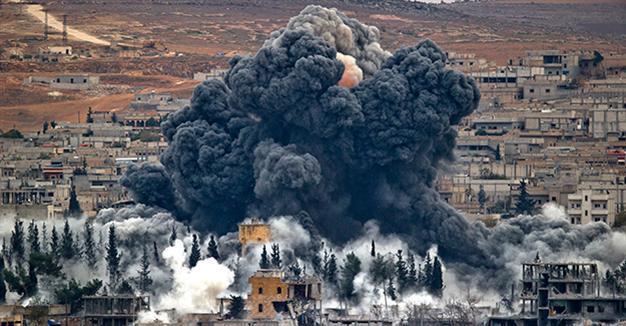UN says major powers feed ‘military escalation’ in Syria
UNITED NATIONS – The Associated Press

In this July 30, 1991 file photo, smoke rises from the Syrian city of Kobani, following an airstrike by the US led coalition, seen from a hilltop outside Suruç, on the Turkey-Syria border. AP Photo
War crimes are “rampant” in Syria, and the conflict has become “a multisided proxy war steered from abroad by an intricate network of alliances,” U.N. investigators said in a new report Feb. 22.In a swipe at the U.S., Russia and their allies, the Independent International Commission of Inquiry on Syria said the international powers and regional countries ostensibly pushing for a peaceful solution are the same nations that “continue to feed the military escalation.”
The new report came as U.S. officials said the U.S. and Russia had agreed on a new “cessation of hostilities” in Syria that will take effect on Feb. 27.
Paulo Sergio Pinheiro, chair of the commission established by the U.N. Human Rights Council, enthusiastically welcomed efforts launched in Vienna and Munich to find a political solution to the conflict, which will enter its sixth year in March with over 250,000 people killed.
The U.N. investigators warned that “the fractured Syrian state is on the brink of collapse” and said there is a growing risk of “internationalization of the conflict.”
Crimes against humanity continue to be committed by government forces and the Islamic State of Iraq and the Levant (ISIL), their report said.
“The fight for control of areas in the hands of enemy forces is carried out with blatant disregard for human life and the laws of war,” Pinheiro told a news conference launching the report. “Not a single warring party respects international humanitarian law, the Geneva conventions, all the conventions of human rights.”
The investigators urged the U.N. Security Council to take action to bring the perpetrators to justice, possibly by referring the situation in Syria to the International Criminal Court or to “an ad hoc tribunal.” Russia and China, allies of Syria, vetoed a referral resolution in May 2014.
“U.N. members need to step up and make clear that any plan for Syria’s future, if it’s to be meaningful and durable, will need justice and respect for human rights at its core,” said Balkees Jarrah, senior counsel at Human Rights Watch’s International Justice Program. “The brutality of the past five years is far too horrendous to be swept under the rug.”
Meanwhile, the international body charged with establishing who is responsible for chemical attacks in Syria said Feb. 22 that it had identified seven potential sites for investigation, which it hoped to begin next month.
Virginia Gamba, who heads the Joint Investigative Mechanism of the U.N. and the Organization for the Prohibition of Chemical Weapons, said an initial report to the Security Council had identified five cases where chemical weapons might have been used. Further analysis led to two other suspected cases: in Binnish in Idlib governorate on March 23, 2015 and in Al Tamanah, also in Idlib, on April 29-30 and May 25-26 in 2014.
Before the Joint Investigative Mechanism, or JIM, was established in August 2015, investigators were charged only with determining whether chemical weapons had been used in an attack. They could not lay blame on the government, opposition or other armed groups.
Gamba said investigators were still analyzing information gathered by the OPCW and hoped to finalize the list of potential cases by March 1, at which point JIM would begin in-depth investigations.
















